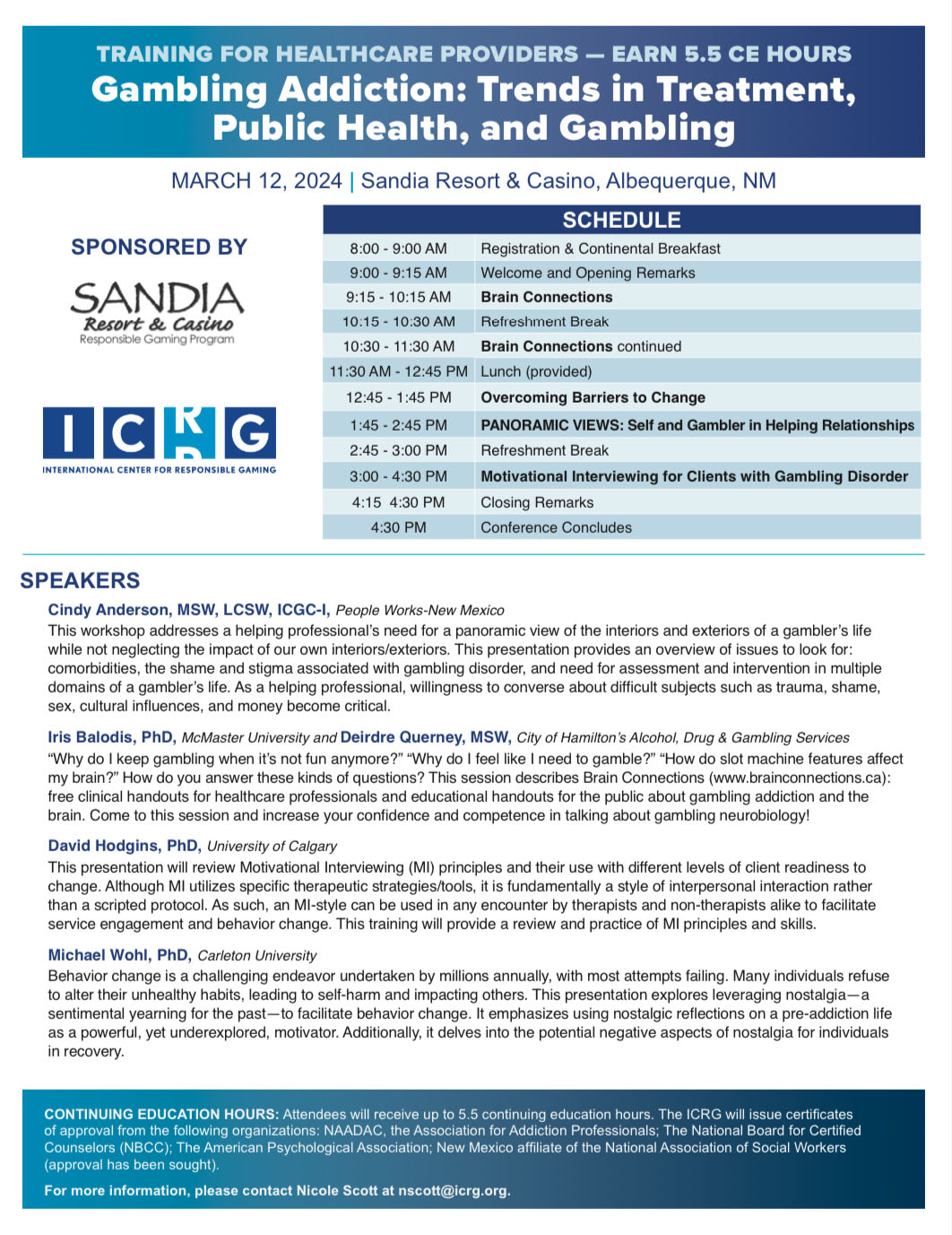
SPEAKERS FOR SANDIA CONFERENCE 2024
Brain Connections: Start Talking with Clients about Gambling and the Brain
Iris Balodis, PhD, McMaster University and Deirdre Querney, MSW, City of Hamilton’s
Alcohol, Drug & Gambling Services
“Why do I keep gambling when it’s not fun anymore?” “Why do I feel like I need to gamble?” “How do slot machine features affect my brain?” How do you answer these kinds of questions? This session describes Brain Connections (www.brainconnections.ca): free clinical handouts for healthcare professionals and educational handouts for the public about gambling addiction and the brain. Come to this session and increase your confidence and competence in talking about gambling neurobiology!
Learning Objectives:
- Learn about the Brain Connections tools and how these apply in your setting
- Accurately answer commonly asked questions about gambling and the brain
- Increase your confidence and competence in talking about gambling
neurobiology
Overcoming Barriers to Change: How Longing for the Past can be Used to Facilitate a Better Future
Michael Wohl, PhD, Carleton University
Behavior change is a challenging endeavor undertaken by millions annually, with most attempts failing. Many individuals refuse to alter their unhealthy habits, leading to self-harm and impacting others. This presentation explores leveraging nostalgia—a sentimental yearning for the past—to facilitate behavior change. It emphasizes using
nostalgic reflections on a pre-addiction life as a powerful, yet underexplored, motivator. Additionally, it delves into the potential negative aspects of nostalgia for individuals in recovery.
Learning objectives:
- Describe why nostalgic reverie (i.e., sentimental longing) is an agent of behavior change
- Identity the conditions under which nostalgia has behavior change utility
- Understand when longing for the past or desire for a better future should be used to motivate behavior change.
Motivational Interviewing for Clients with Gambling Disorder
David Hodgins, PhD University of Calgary
This presentation will review Motivational Interviewing (MI) principles and their use with different levels of client readiness to change. Although MI utilizes specific therapeutic strategies/tools, it is fundamentally a style of interpersonal interaction rather than a scripted protocol. As such, an MI-style can be used in any encounter by therapists and non-therapists alike to facilitate service engagement and behavior change. This training will provide a review and practice of MI principles and skills.
Learning objectives
- Participants will review the philosophy and principles of the motivational interviewing approach
- Participants review and learn basic motivational interviewing techniques.
- Participants will explore how motivational techniques can be used to help clients engage in the treatment process (avoid dropout)
PANORAMIC VIEWS: Self and Gambler in Helping Relationships
Cindy Anderson, MSW, LCSW, ICGC-I, Founder and Executive Director People Works-New Mexico
This workshop addresses a helping professional’s need for a panoramic view of the interiors and exteriors of a gambler’s life while not neglecting the impact of our own interiors/exteriors. This presentation provides an overview of issues to look for: comorbidities, the shame and stigma associated with gambling disorder, and need for
assessment and intervention in multiple domains of a gambler’s life. As a helping professional, willingness to converse about difficult subjects such as trauma, shame, sex, cultural influences, and money become critical.
Learning objectives:
- Identify 3 potential comorbidities or associated conditions found in problem gambling.
- Identify 3 domains of a gambler’s life that you should include in your assessment and possible interventions.
- Identify your own biases and difficulty in helping problem gamblers.




